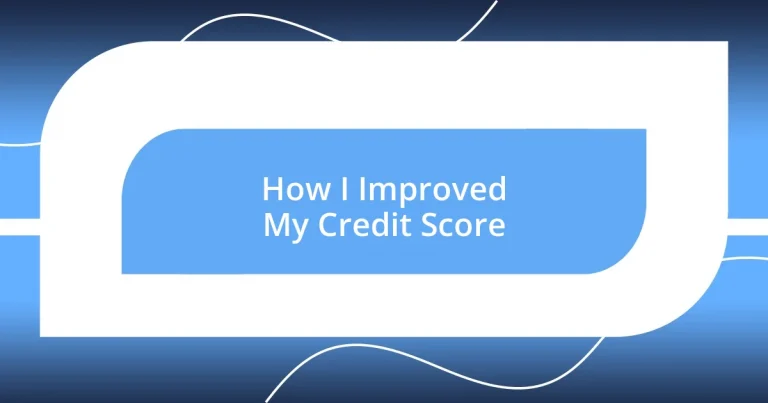Key takeaways:
- Understanding credit scores is crucial for financial health; they impact loan approvals, interest rates, and overall financial reliability.
- Key factors affecting credit scores include payment history, credit utilization ratio, credit history length, types of credit, and new credit inquiries.
- Proactive strategies, such as setting up automatic payments, monitoring credit progress, and seeking professional help when needed, are essential for maintaining and improving credit scores.
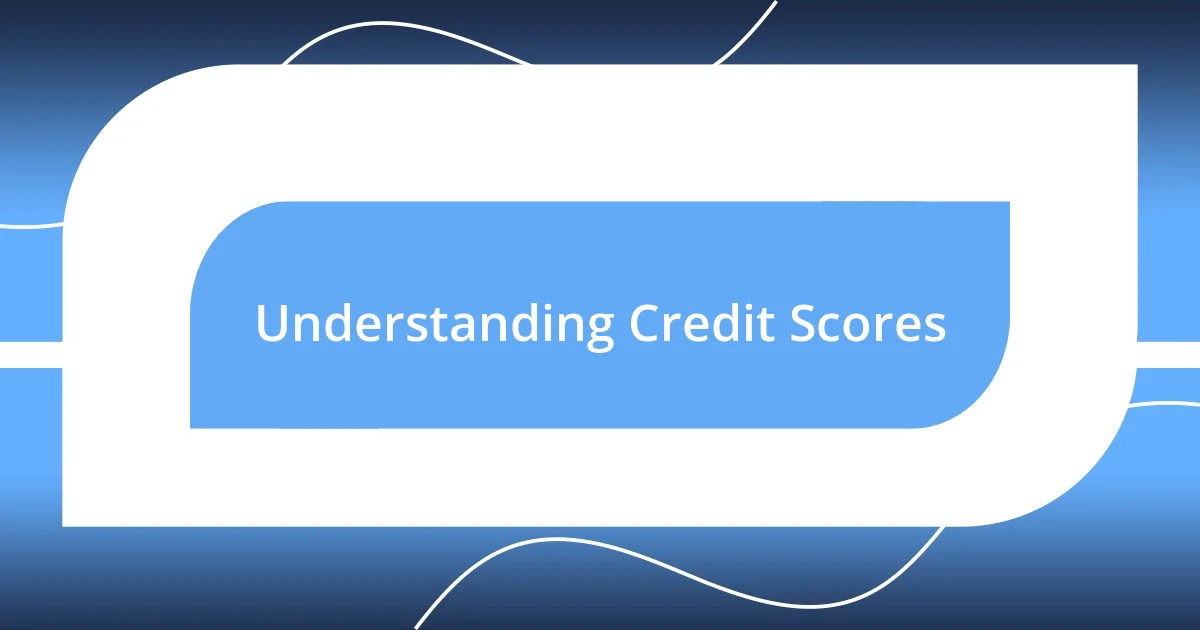
Understanding Credit Scores
Credit scores can feel like a maze, can’t they? When I first encountered mine, I was surprised by how much it could fluctuate based on my borrowing habits and payment history. I quickly learned that my score wasn’t just a number; it represented my financial reliability and could determine so many aspects of my life, from loan approvals to interest rates.
I remember the moment I realized how essential understanding credit scores was for long-term financial health. I had a friend who, despite earning a good salary, struggled to secure a mortgage because of a low credit score. It made me wonder—how many others overlook their scores until it’s too late? It’s so crucial to recognize that maintaining a healthy credit score requires proactive management of our financial behaviors, like timely payments and careful credit utilization.
Unpacking the components of a credit score for me felt like a revelation. I discovered that factors like payment history, credit mix, and recent inquiries all play roles in affecting the score. Reflecting on how my spending habits influenced my score brought a sense of empowerment; it was no longer an abstract concern, but something I could actively manage. Have you ever thought about how your financial choices ripple out into the world? Understanding this connection helped me take charge of my financial future.
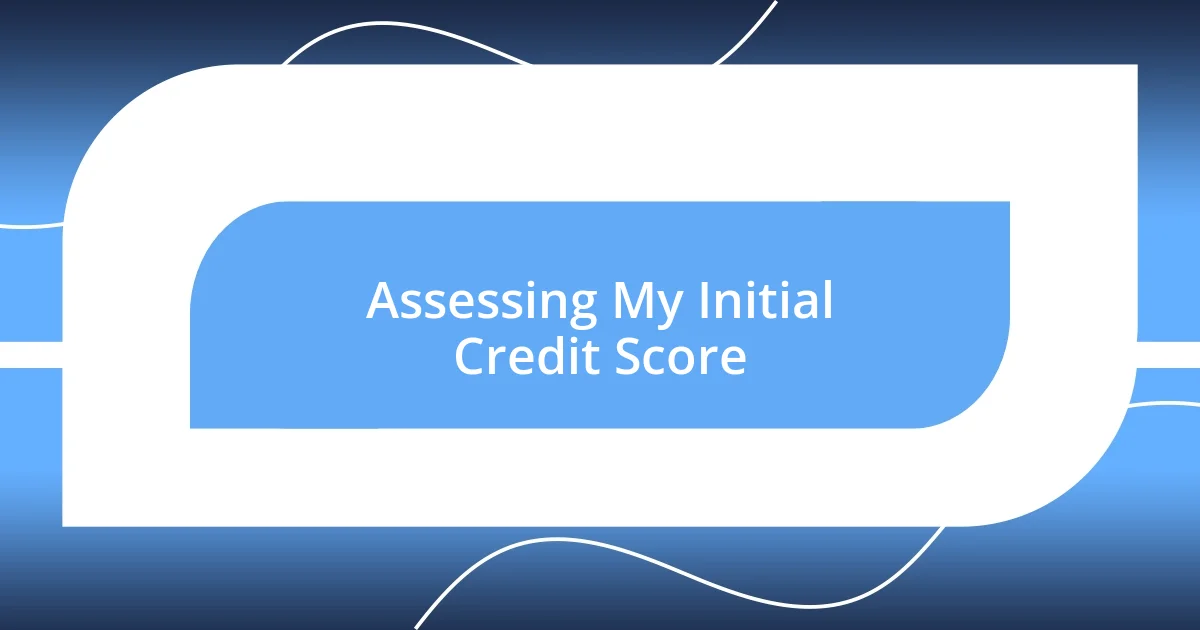
Assessing My Initial Credit Score
When I first checked my credit score, I was both curious and anxious. Seeing that number was eye-opening; it was lower than I expected. I felt a wave of confusion wash over me as I tried to understand what put me in that position. It was then that I realized the specific factors contributing to my credit situation would require immediate attention if I wanted to make meaningful changes.
I decided to dive deeper into the details. My payment history, the length of my credit history, and even the type of accounts I had were all laid out like pieces of a puzzle. I remember looking at my credit report and feeling a mix of frustration and determination. It became clear that careless spending and a few late payments had a more significant impact than I had imagined. This realization ignited a commitment within me to turn things around.
Reflecting on my initial credit assessment led me to seek out tools for improvement. I compared my score against the ranges and benchmarks provided by credit bureaus, which helped me set tangible goals. That moment felt like the first step on a journey towards financial empowerment, where I no longer felt like a passive observer but rather an active participant in shaping my financial destiny.
| Credit Score Range | My Initial Score |
|---|---|
| 300-579 (Poor) | 535 |
| 580-669 (Fair) | – |
| 670-739 (Good) | – |
| 740-799 (Very Good) | – |
| 800-850 (Excellent) | – |
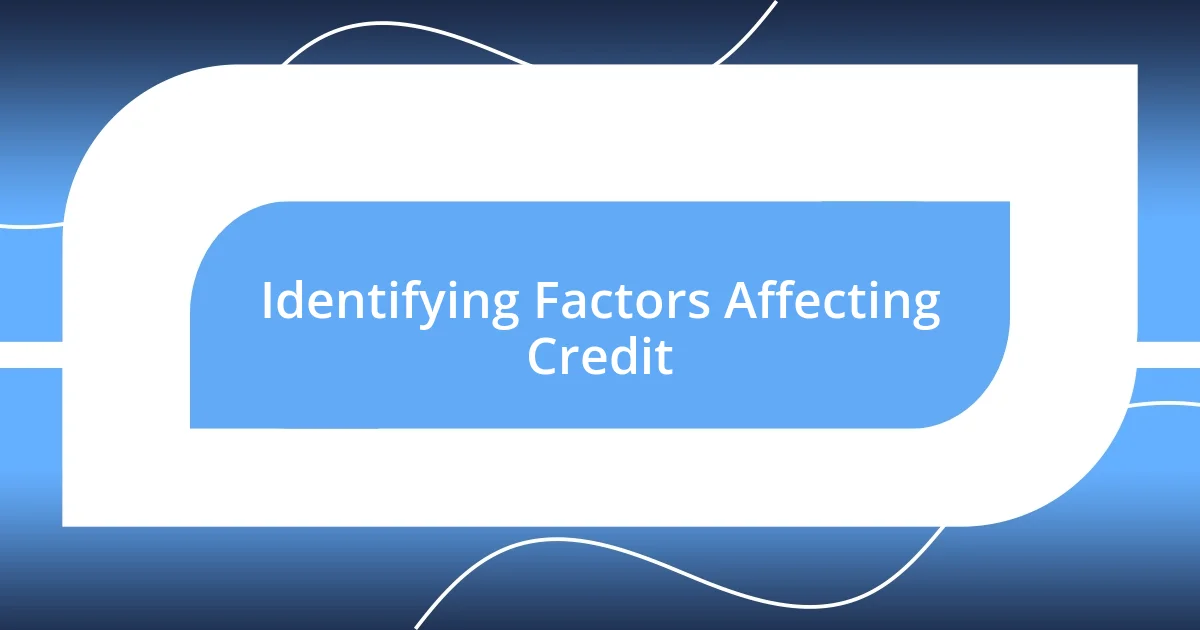
Identifying Factors Affecting Credit
Identifying what affects your credit score can feel like uncovering hidden treasures. For me, the most significant revelation was the impact of my payment history. When I realized that a single late payment could linger for years, I felt a sense of urgency. It was a heavy emotional weight knowing that my choices could have lasting effects on my financial future.
Here are key factors that influence credit scores:
-
Payment History (35%): This is the most crucial factor. Making late payments, even by a few days, can drastically hurt your score.
-
Credit Utilization Ratio (30%): I learned the importance of keeping this below 30%. Using a high percentage of your credit limit signals potential financial trouble.
-
Length of Credit History (15%): An older average age of accounts positively impacts your score, adding credibility to your creditworthiness.
-
Types of Credit (10%): Having a mix of credit cards, retail accounts, and installment loans shows lenders you can manage different types of debt.
-
New Credit Inquiries (10%): Frequent applications for credit can lead to multiple inquiries, which may indicate to lenders that you’re a risky borrower.
Understanding these factors was a game-changer for me. I remember feeling a mixture of empowerment and responsibility as I realized that my habits could either build or erode my score. With this knowledge, I began to take deliberate actions to improve my situation.
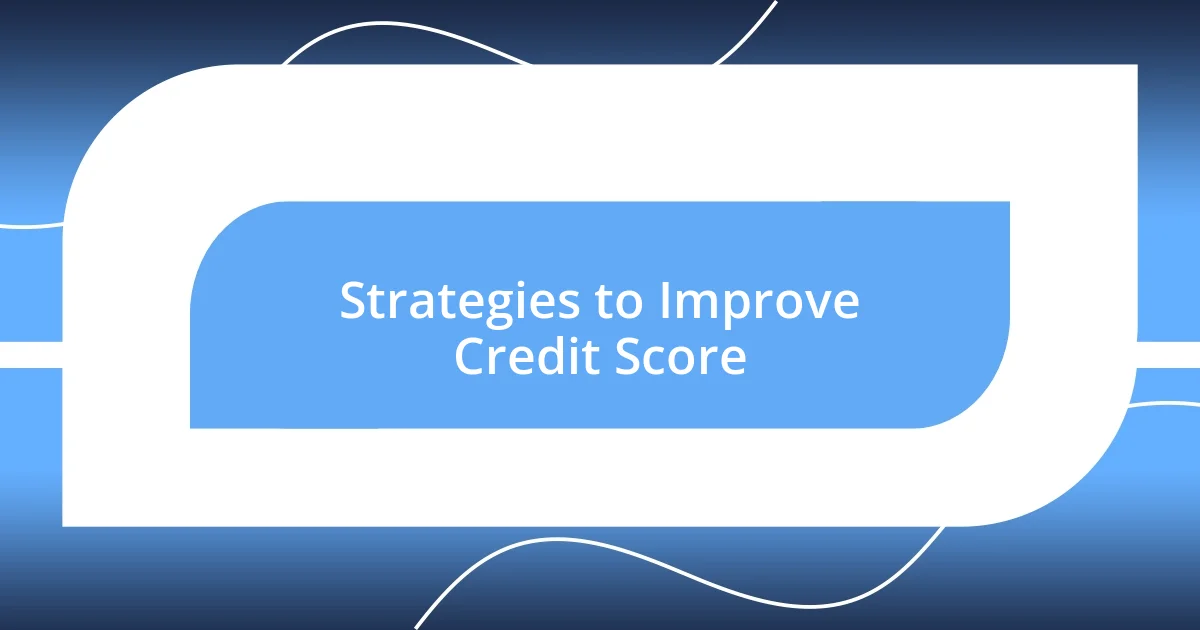
Strategies to Improve Credit Score
When I started working on my credit score, one of my strategies was to set up automatic payments for my bills. I still remember the moment I realized that forgetting one due date could have such a long-lasting impact. It felt like a lightbulb went off — why not use technology to my advantage? This simple step not only ensured my payments were always on time but also lifted a significant emotional weight off my shoulders.
Another effective strategy I adopted was reducing my credit utilization ratio. I used to think that keeping my credit cards close to their limits was fine, but when I learned that lenders prefer to see that number below 30%, it was like a wake-up call. I started by paying down my balances more aggressively and even considered asking for credit limit increases. It was empowering to actively decrease that percentage, knowing it would positively influence my score.
Finally, I made sure to periodically check my credit report for any inaccuracies. I was surprised by how many errors I found. It’s a good practice to review your report at least once a year; I mean, wouldn’t you want to know if something was holding you back? Disputing even a small mistake felt like taking control of my financial narrative. Each successful correction boosted not only my score but also my confidence in managing my credit responsibly.
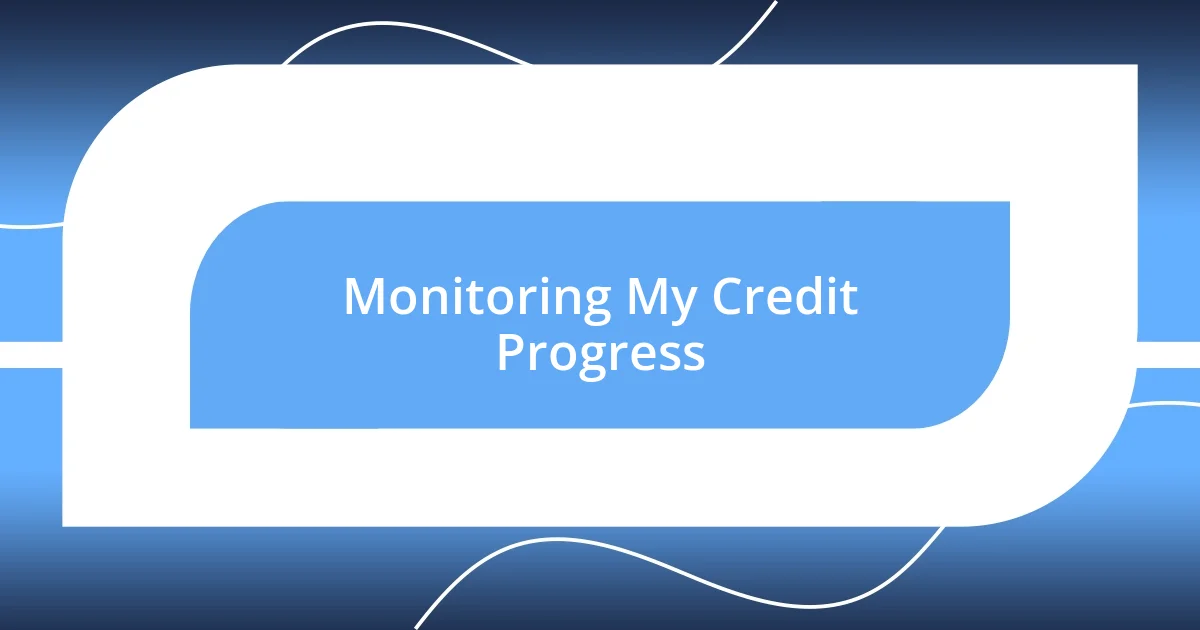
Monitoring My Credit Progress
Monitoring my credit progress became a vital part of my journey towards improvement. I remember feeling a sense of accountability every time I checked my score. I used to think it was just a number, but seeing it shift in real-time gave me a deeper understanding of how my daily choices were directly affecting my financial health. Have you ever had that moment of realization when the data truly resonates with you? It’s like flipping on a light switch.
I frequently used credit monitoring tools to stay updated, relishing the alerts they sent my way. One time, I checked and found that my score had jumped up ten points! I felt a rush of pride, as if I had just scored a winning goal in a game. These tools not only provided insights into my credit score but also helped me keep tabs on any changes, allowing me to react quickly to any potential issues. Knowing I had these resources made me feel like I was steering the ship instead of being tossed around by the waves.
Tracking my progress also offered the chance to celebrate milestones. I vividly recall hitting a particularly high score and treating myself to a nice dinner – not to mention how I shared my success with friends. This made it more than just a number; it became a shared victory, reinforcing positive habits. Celebrating these achievements reminded me that improving my credit score wasn’t just about the end goal, but also about acknowledging the little victories along the way. What small wins have you celebrated in your credit journey?
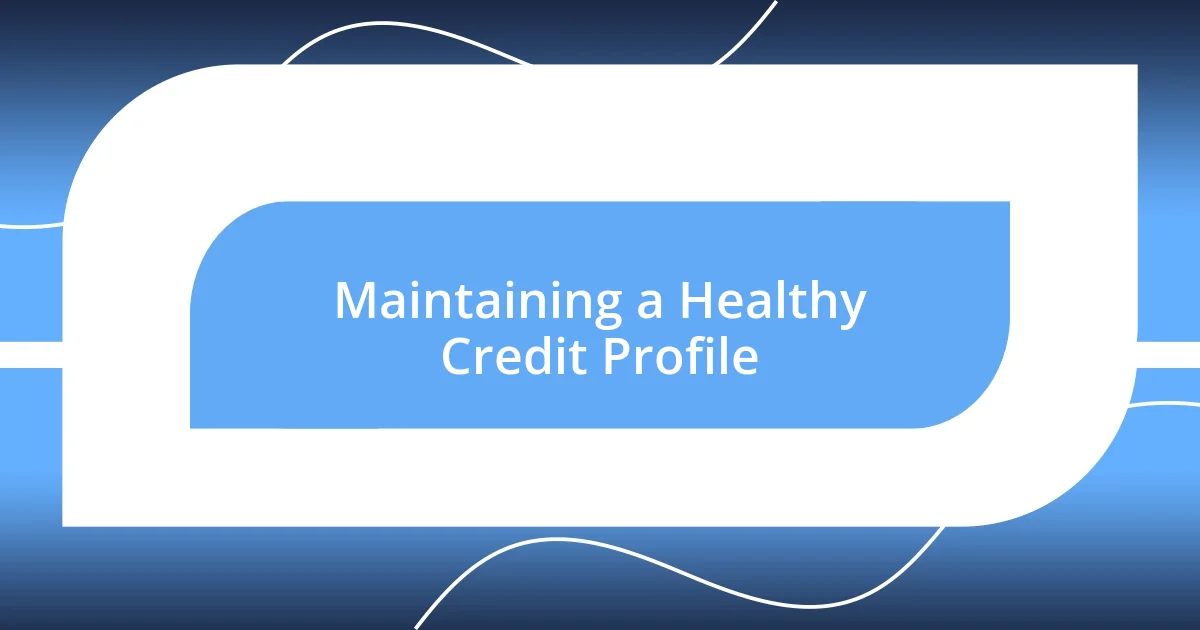
Maintaining a Healthy Credit Profile
Maintaining a healthy credit profile is all about consistency and awareness. I still recall the first time I set reminders on my phone for upcoming payments. Initially, it felt like just another task on my to-do list, but as the months rolled on, I started to feel a sense of pride every time I marked a payment as completed. Isn’t it amazing how a simple nudge can keep you on track and contribute to long-term success?
Another key to my credit health was keeping my personal information up to date. When I moved to a new address, I learned the importance of notifying my lenders. I was surprised to find that changing my address improved my creditworthiness, as it reduced the risk of delayed communications about my account. Have you ever considered how something as straightforward as an address update could potentially impact your credit profile?
Lastly, I regularly engaged in proactive communication with my creditors, especially when I faced a financial hiccup. I remember when I faced unexpected medical expenses and called my credit card company to discuss my options. Their willingness to work with me not only alleviated my stress but also reflected positively on my credit history. This taught me that open dialogue and transparency can be powerful tools in maintaining a healthy credit profile. Have you ever reached out for assistance, only to find that it led to unexpected support?
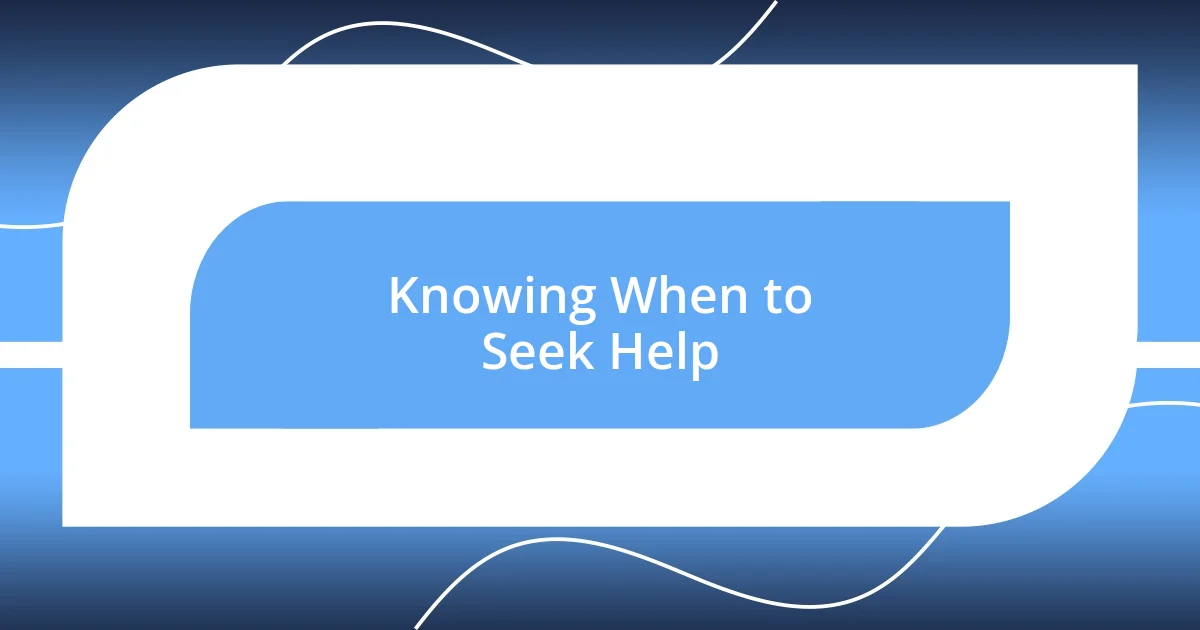
Knowing When to Seek Help
Knowing when to seek help can be one of the most crucial decisions on the path to improving your credit score. I remember a time when I felt overwhelmed by my mounting debt and decided to consult a financial advisor. That conversation opened my eyes to strategies I had never considered, like consolidating my loans to make payments more manageable. Have you ever felt lost and wished for someone to guide you through complex financial waters?
It’s important to recognize the signs that indicate you might benefit from professional support. For instance, when the stress of unpaid bills started affecting my mental health, I knew it was time to reach out. That moment, when I acknowledged my struggle, felt like lifting a heavy weight off my shoulders. Have you ever realized that seeking help could lead to relief rather than shame?
Moreover, I’ve learned that seeking assistance isn’t a sign of weakness, but rather a proactive step toward empowerment. After I reached out to a credit counseling service, they helped me craft a personalized plan for improvement. I recall feeling a sense of hope that had been missing before. Seeking help not only provided practical advice but also restored my confidence in my ability to regain control of my financial future. Have you allowed yourself to seek support in your own financial journey?












